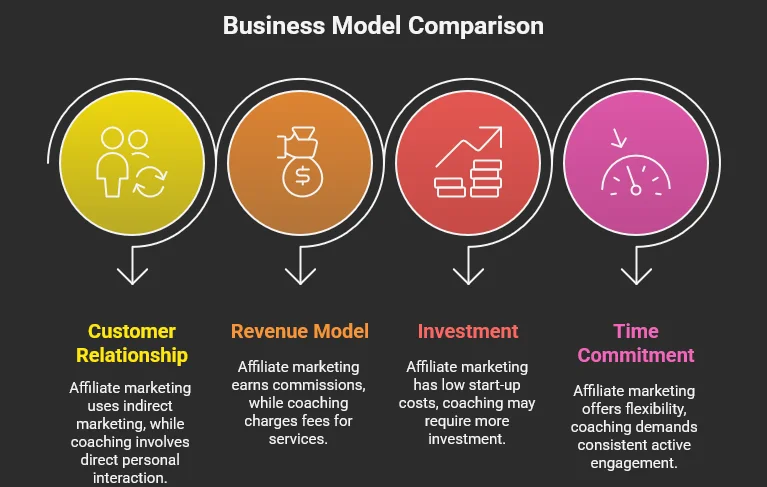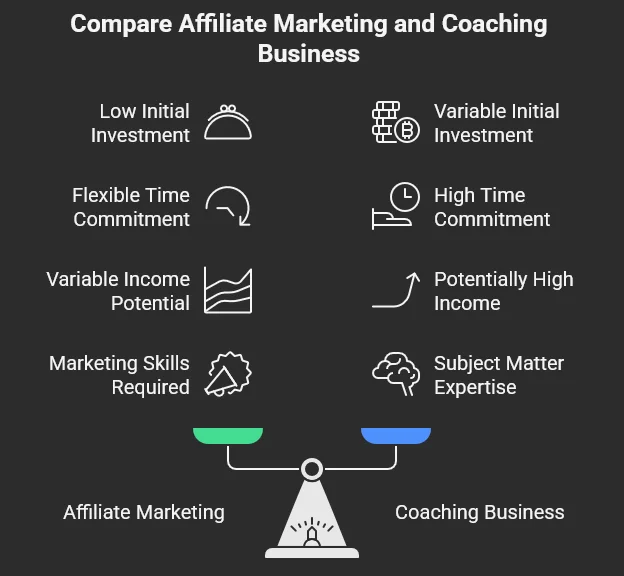
Understanding the key differences and similarities between Affiliate Marketing Vs Coaching Business can significantly shape your entrepreneurial journey. Both avenues offer exciting opportunities, yet they appeal to different skill sets and business models. Let’s delve into these two paths to uncover what sets them apart and where they overlap.
Overview of Affiliate Marketing
Affiliate marketing is a performance-based marketing strategy where you earn a commission for promoting another company’s products or services. You typically share these offerings through your website, social media, or other channels. Key aspects include:
- Low Startup Costs: Affiliate marketing allows you to start with minimal investment, often requiring just a website or online presence.
- Passive Income Potential: Once you create content and attract an audience, you can earn income even when you’re not actively working.
- No Customer Support Required: Your primary role is marketing. You don’t handle inventory or customer service, which can significantly reduce your workload.
Overview of a Coaching Business
A coaching business focuses on providing guidance and support to clients, helping them achieve specific goals. This could be in various fields, such as career coaching, health and wellness, or life coaching. Here are some noteworthy aspects:
- Personal Interaction: Coaching involves direct engagement with clients, which can foster deeper connections and a more personalized approach to their needs.
- Higher Revenue Potential: Coaching services can command higher fees, especially if you have specialized expertise or credentials.
- Flexible Business Models: You can offer one-on-one sessions, group coaching, or online courses, giving you several revenue streams.
Key Differences: Affiliate Marketing Vs Coaching Business
| Feature | Affiliate Marketing | Coaching Business |
|---|---|---|
| Customer Relationship | Indirect relationship through marketing. | Direct relationship through personal coaching. |
| Revenue Model | Commission-based earnings. | Fee-based services and offerings. |
| Investment | Low start-up costs. | Potentially higher start-up costs for training and marketing. |
| Time Commitment | Flexibility with passive income. | Active engagement requires consistent time investment. |
Similarities Between the Two
While different, both Affiliate Marketing Vs Coaching Business share some common ground:
- Online Presence: Both require a strong internet presence to reach potential clients or customers effectively.
- Content Creation: Creating valuable content is essential in both fields to attract and engage your audience.
- Networking Opportunities: Both fields allow you to connect with others in similar industries, leading to potential collaborations and increased visibility.
Which Path Is Right for You?
Your decision between Affiliate Marketing Vs Coaching Business should reflect your interests, skills, and lifestyle aspirations. Consider asking yourself the following questions:
- Do you prefer working independently, or do you enjoy personal interaction with clients?
- Are you comfortable with direct sales and coaching, or do you prefer promoting existing products?
- What kind of investment are you willing to make in terms of time and money?
If you lean towards creating content and enjoy marketing, affiliate marketing might be your best bet. However, if you have a passion for helping others grow and thrive, a coaching business could be more fulfilling. Both Affiliate Marketing Vs Coaching Business can be rewarding paths, but they cater to different entrepreneurial spirits. Explore more about each area to find what best aligns with your goals. For further insights, consider visiting websites like Smart Passive Income for affiliate marketing tips and International Coach Federation for coaching resources.
As you navigate these choices, remember that success in either field will depend on your dedication, strategy, and willingness to adapt to evolving markets.
The Financial Potential of Affiliate Marketing
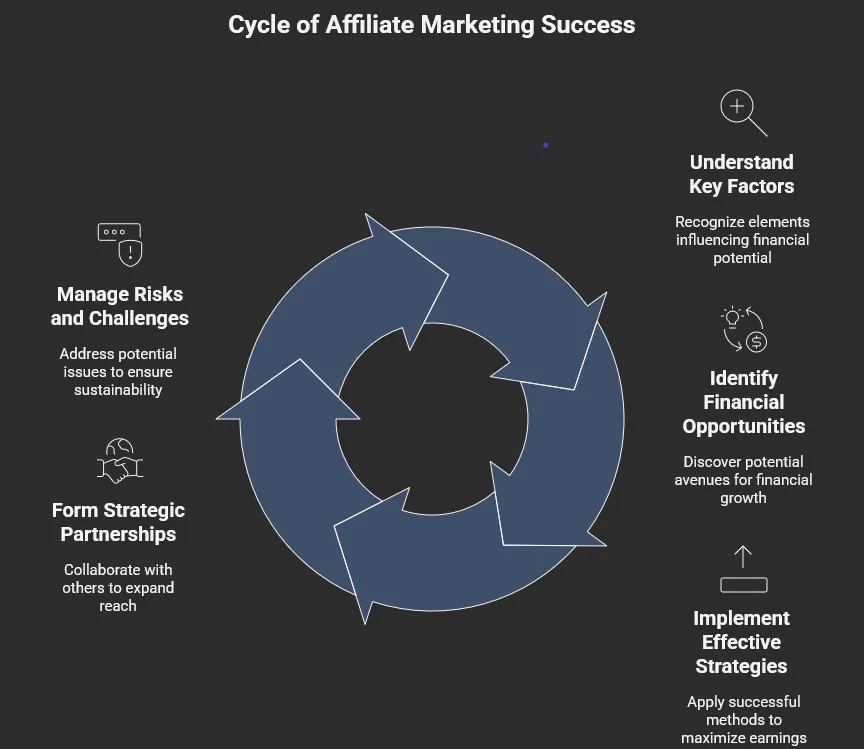
Affiliate marketing has gained tremendous popularity as one of the most accessible ways for individuals and businesses to generate income online. With a relatively low barrier to entry, anyone with a computer and internet access can start promoting products or services and earn a commission for every sale made through their unique referral link. This has led many to explore the financial potential of affiliate marketing.
Understanding Affiliate Marketing
At its core, affiliate marketing involves three key players: the merchant, the affiliate, and the consumer. The merchant is the product owner, the affiliate is the marketer who promotes the product, and the consumer is the end user who makes a purchase. This partnership creates a win-win situation where everyone benefits.
Key Factors Influencing Financial Potential
Several factors play a vital role in determining how much money one can make through affiliate marketing:
- Selection of Niche: Choosing the right niche is essential. Popular and evergreen niches like health, finance, beauty, and technology often yield higher returns.
- Traffic Generation: The more targeted traffic you can drive to your affiliate links, the better your chances of making sales. This involves SEO, content marketing, and social media strategies.
- Commission Rates: Different affiliate programs offer varying commission structures. High-ticket items or subscription services often provide larger commissions.
- Marketing Strategy: Utilizing effective marketing techniques, including email marketing and content marketing, will greatly enhance your affiliate income potential.
- Building Trust and Authority: Establishing credibility with your audience can lead to higher conversion rates. When people trust your recommendations, they are more likely to purchase.
Financial Opportunities in Affiliate Marketing
The financial opportunities through affiliate marketing can be broken down into several potential earnings models:
| Model | Description | Potential Earnings |
|---|---|---|
| Pay-per-Sale (PPS) | You earn a commission when a referred customer makes a purchase. | 5% – 50% per sale |
| Pay-per-Click (PPC) | You earn a fee whenever someone clicks on your affiliate link, regardless of whether they make a purchase. | Varies (typically $0.05 – $1.00 per click) |
| Pay-per-Lead (PPL) | You earn a commission for generating leads, such as sign-ups for newsletters or free trials. | $1 – $100 per lead |
Real-Life Examples of Financial Success
Numerous individuals have achieved significant success through affiliate marketing. For instance, successful affiliates in various niches report earning anywhere from a few hundred to several thousand dollars a month. Many affiliates leverage platforms such as Amazon Associates or ClickBank to earn their income. Top performers can earn six-figure incomes by following efficient strategies and continually optimizing their efforts.
The Risks and Challenges
While the financial potential in affiliate marketing is enticing, it is important to be aware of its challenges:
- Market Saturation: Some niches can become saturated, making it difficult to stand out.
- Algorithm Changes: Platforms like Google and social media sites frequently change their algorithms, impacting traffic and visibility.
- Dependence on Third-Party Companies: Affiliates rely on the merchants’ performance and reputation, which can influence their earnings.
The financial potential of affiliate marketing is significant, but it requires diligence, strategy, and continuous improvement. With a solid understanding of the market, a strong marketing plan, and dedication, many individuals can turn affiliate marketing into a lucrative source of income. For more resources and insights into affiliate marketing, check out Affiliate Guard Dog and ShoutMeLoud.
Building a Brand in the Coaching Industry
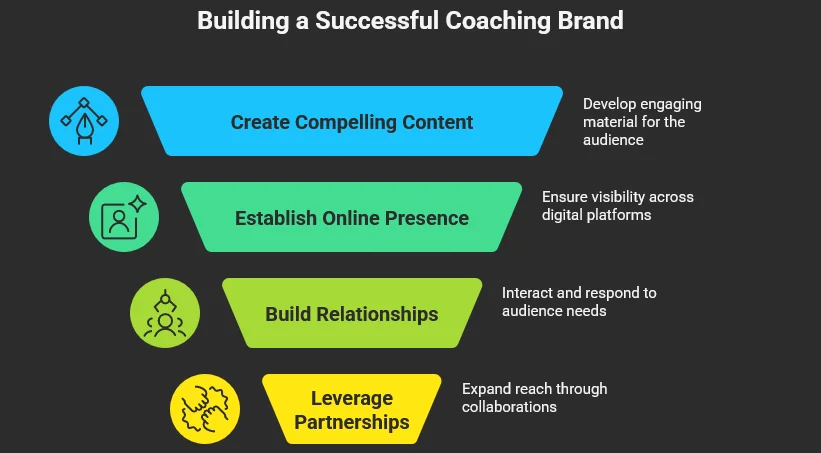
In today’s competitive landscape, building a brand in the coaching industry requires a blend of strategy, authenticity, and engagement. Your brand is not just a logo or a catchy name; it’s the perception that your clients have of you and your services. Here’s how you can create a strong brand that resonates with your target audience.
Know Your Niche
Understanding your niche is crucial. What specific area of coaching do you excel in? This could be life coaching, business coaching, health coaching, or any other specialized field. Here’s how to pinpoint your niche:
- Assess Your Skills: Identify what you are naturally good at and what topics you are passionate about.
- Research Market Needs: Look for gaps in the market. What do potential clients need that isn’t being offered?
- Define Your Audience: Who will benefit the most from your coaching services? Creating a detailed customer persona can help.
Create Compelling Content
To build your brand, you need to engage your audience with valuable content. Good content not only showcases your expertise but also connects you with your audience on a deeper level. Here are some ways to create content that matters:
- Blogging: Start a blog on your coaching website where you share insights, tips, and success stories.
- Social Media: Utilize platforms like Instagram, Facebook, and LinkedIn to share bite-sized advice and connect with followers.
- Video Content: Create videos that offer practical coaching tips or answer common questions in your niche.
- Webinars: Host interactive webinars to engage with potential clients and provide valuable information.
Establish Your Online Presence
Your online presence is your storefront. Make sure you have a well-designed website that reflects your brand. Consider these elements:
- Professional Design: Invest in a clean, professional website design that embodies your brand identity.
- SEO Optimization: Optimize your website for search engines by using relevant keywords, such as “coaching services,” or “personal development coach.”
- Testimonials and Reviews: Feature client testimonials prominently on your site to build trust and credibility among potential clients.
Build Relationships with Your Audience
Your brand grows stronger with relationships. Engage with your audience both online and offline. Here’s how to foster connections:
- Email Marketing: Create an email list to share insights, tips, and updates with your audience regularly.
- Networking: Attend industry events to meet potential clients and collaborators. Building these relationships can lead to referrals.
- Engage on Social Media: Respond to comments and messages promptly. Show your audience that you care about their concerns and feedback.
Leverage Partnerships
Working with other professionals in your industry can enhance your brand’s visibility. Seek partnerships that align with your values and goals. For example:
- Joint Ventures: Collaborate on workshops or courses with fellow coaches.
- Affiliate Programs: Create affiliate programs to encourage others to promote your services.
Stay Authentic
In the coaching industry, authenticity is key. Be true to yourself and your values. Share your personal story; it can make you more relatable. People want to connect with you as a person, not just as a coach. This honesty can help foster a stronger connection with your audience.
Building a successful brand in the coaching industry takes time and effort. As you grow your brand, remember to adapt and evolve based on feedback and industry trends. For more insights about building a coaching brand, you can explore resources on ICF or Coaching.com.
With the right strategies and a focus on your audience’s needs, you can create a compelling brand that not only stands out but also makes a meaningful impact in the coaching industry.
Strategies for Success in Affiliate Marketing
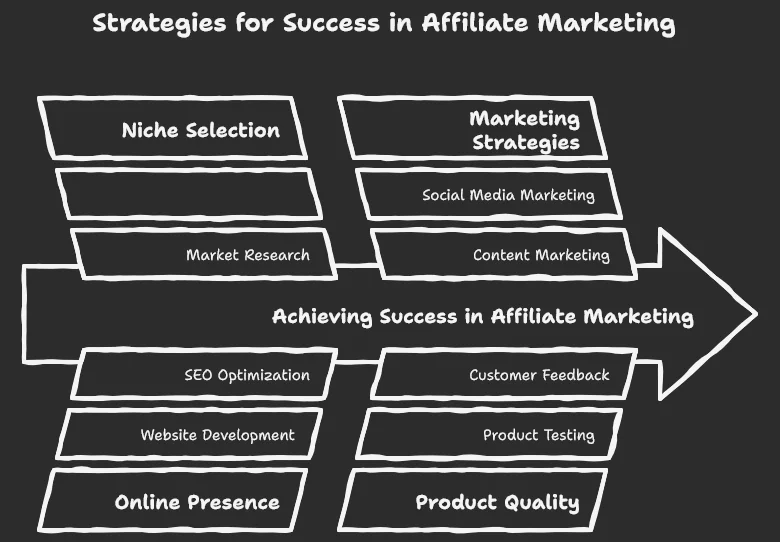
Affiliate marketing is a popular way to earn money online by promoting products or services from various companies and earning a commission for each sale or lead generated through your referral. For those looking to succeed in this dynamic field, effective strategies make all the difference. Understanding the key components of affiliate marketing can lead you to a thriving online business.
Choose your niche
First, you need to choose a niche that you are passionate about. Starting in a niche you love allows you to stay motivated and create authentic content. It is essential to research your niche to ensure there is enough demand and that you can find affiliate programs related to it. There are many resources to help you evaluate niche popularity, such as Google Trends.
Building a strong online presence
Next, building a strong online presence through a website or blog is crucial. Your website is a platform where you can create valuable content for your audience. Focus on offering insights, product reviews, or how-to guides. Use relevant keywords strategically to enhance your site’s visibility. This ensures that your content reaches the right audience and ranks well on search engines, drawing organic traffic.
Leverage Social Media
Another effective strategy is to leverage social media. Platforms like Facebook, Instagram, and Twitter are great channels for promoting affiliate products. You can build a community around your niche by sharing helpful content, engaging with your followers, and promoting products. Consider using paid advertising on social media to reach a more extensive audience. Paid ads can provide targeted exposure, leading to increased conversions.
Content marketing
Content marketing is vital in affiliate marketing. Producing high-quality content will establish you as an authority in your niche. You can create various forms of content, such as blogs, videos, podcasts, and infographics. Diversifying your content attracts different types of audience members, expanding your reach. To improve engagement, consider using eye-catching visuals and storytelling techniques in your content.
Choose quality product
When choosing affiliate programs, opt for reputable networks and trustworthy products. Research the commission structure and ensure it aligns with your business goals. Programs like Amazon Associates and ClickBank offer a wide range of products and resources for beginners. Make sure to evaluate the payout rates and payment methods before committing to a program.
Tracking performance
Tracking your performance is essential for understanding what strategies work best. Use analytics tools to monitor traffic, conversion rates, and sales. Google Analytics can provide insights into your audience’s behavior, helping you tweak your strategies effectively.
Building an email list
Building an email list can significantly increase your affiliate marketing success. Capture leads by offering subscribers exclusive content, discounts, or a free product. Once you have a list, use it to nurture relationships with your audience by sending relevant information and product recommendations. This can lead to higher conversions as you drive traffic to your affiliate links.
Networking with other marketers
Networking with other marketers can enhance your learning and open up new opportunities. Join forums or groups related to affiliate marketing, such as the Affiliate Marketing subreddit. Sharing experiences and learning from others can help you overcome challenges and improve your strategies.
Prepare to adapt
Always be prepared to adapt. The online marketing landscape is constantly changing due to trends, algorithm updates, and consumer behavior shifts. Stay updated with industry news and be willing to experiment with new strategies. This flexibility can give you a competitive edge, ensuring you remain relevant in the ever-evolving world of affiliate marketing.
Implementing these strategies will help you lay a solid foundation for your affiliate marketing journey. Remember that success takes time, dedication, and perseverance. Stay focused on providing value while continuously refining your approach, and you’ll be on your way to achieving your affiliate marketing goals.
How to Choose Between Affiliate Marketing and Starting a Coaching Business
When considering the path to financial freedom, two popular avenues often come to mind: affiliate marketing and coaching businesses. Each has its unique appeal, benefits, and challenges. Understanding their distinctions is vital to making a choice that aligns with your goals. Here’s a detailed look to help you navigate the decision-making process.
Understanding Affiliate Marketing
Affiliate marketing is a performance-based model where you earn commissions by promoting products or services from other companies. You act as an intermediary, sharing your referral link through various channels such as social media, blogs, or email marketing. When someone makes a purchase through your link, you earn a percentage of that sale.
Pros of Affiliate Marketing
- Low Start-up Costs: You don’t need to create your own product, which cuts down initial investments.
- Flexibility: You can work from anywhere and choose when to promote products.
- Scalability: Your income potential can increase with the right traffic and offers.
Cons of Affiliate Marketing
- Dependence on Third Parties: Your income is reliant on the affiliate programs’ rules and product availability.
- Income Fluctuations: Earnings can be unpredictable, affected by market trends and consumer behavior.
- Marketing Skills Required: Effective promotion requires strong online marketing skills.
Exploring Coaching Businesses
A coaching business involves offering guidance, support, and expertise in a particular subject. Whether it’s life coaching, business coaching, or fitness coaching, you work directly with clients to help them achieve specific goals. This model is typically more personal and interactive than affiliate marketing.
Pros of a Coaching Business
- Direct Engagement: Building personal relationships with clients can lead to higher satisfaction and trust.
- Customizable Offers: You can tailor your services to meet the specific needs of your clients.
- High Income Potential: Coaching can yield higher rates for services, depending on your expertise.
Cons of a Coaching Business
- Requires Expertise: You need substantial knowledge and skills in your chosen area.
- Time-Intensive: Coaching often requires ongoing commitment and time investment.
- Marketing Challenges: Attracting clients may require effective marketing strategies and networking.
Key Considerations for Your Decision
Choosing between Affiliate Marketing Vs Coaching Business can be complex. Here are some factors to weigh:
| Factors | Affiliate Marketing | Coaching Business |
|---|---|---|
| Initial Investment | Low | Varies based on branding and marketing |
| Time Commitment | Flexible | High when building relationships |
| Income Potential | Variable | Potentially high with reputation |
| Skills Required | Marketing skills | Subject matter expertise |
Aligning Your Skills and Interests
Your personal skills and interests should play a significant role in your decision. If you have a passion for helping others achieve their goals and possess expertise in a specific area, a coaching business may be a perfect fit. Conversely, if you’re more inclined toward digital marketing and performance-based earnings, affiliate marketing could align better with your strengths.
Testing the Waters
If you’re torn between the two, consider starting both. You can engage in affiliate marketing while building a coaching practice on the side. This dual approach allows you to gain experience and insights from each model without fully committing to one over the other. You might find that one suits you better as you progress.
In your journey to choose between Affiliate Marketing Vs Coaching Business, remember to align your path with your values, strengths, and long-term goals. Both avenues offer lucrative opportunities when pursued effectively. For more insights into affiliates, check out Affiliate Marketing and for coaching resources, consider Coaching.com.
Conclusion: Affiliate Marketing Vs Coaching Business
Choosing between Affiliate Marketing Vs Coaching Business ultimately depends on your skills, interests, and long-term goals. Both avenues offer unique benefits and challenges. Affiliate marketing can provide a scalable income through commissions, requiring less initial investment but more effort in online marketing strategies. You can leverage existing brands to earn passive income if done effectively.
On the other hand, building a coaching business often revolves around creating a personal brand and establishing credibility. It demands a deeper emotional investment, and your success largely hinges on the value you offer through your expertise. Whereas affiliate marketing could be seen as less personal, coaching empowers you to connect with individuals on a meaningful level, guiding them toward their goals.
As you weigh your options, consider your strengths. If you excel in content creation, audience engagement, or strategic partnerships, affiliate marketing might be more suitable. If you’re passionate about teaching and mentoring others, the coaching business could be your best fit.
Both paths can complement each other. Many coaches use affiliate marketing as an additional revenue stream, promoting tools and resources that benefit their clients. Regardless of the choice, focus on providing real value, whether through targeted strategies in affiliate marketing or the transformational journeys in coaching. Your success in either field depends on your commitment, adaptability, and the relationships you build along the way. Decide what resonates with you, and pursue it with passion.

